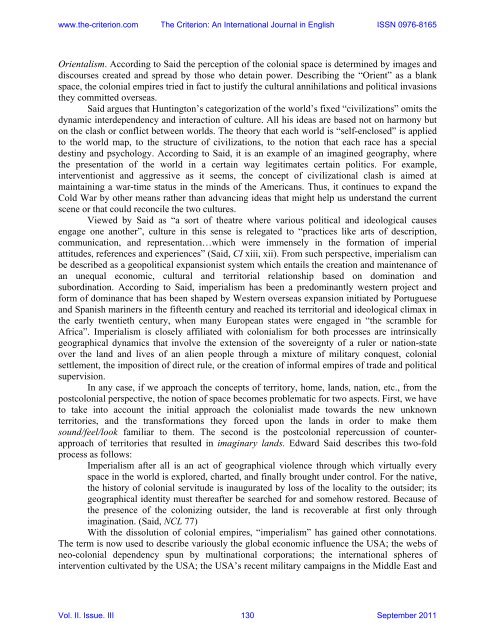Vol. II. Issue. III September 2011 - The Criterion: An International ...
Vol. II. Issue. III September 2011 - The Criterion: An International ...
Vol. II. Issue. III September 2011 - The Criterion: An International ...
You also want an ePaper? Increase the reach of your titles
YUMPU automatically turns print PDFs into web optimized ePapers that Google loves.
www.the-criterion.com <strong>The</strong> <strong>Criterion</strong>: <strong>An</strong> <strong>International</strong> Journal in English ISSN 0976-8165<br />
Orientalism. According to Said the perception of the colonial space is determined by images and<br />
discourses created and spread by those who detain power. Describing the “Orient” as a blank<br />
space, the colonial empires tried in fact to justify the cultural annihilations and political invasions<br />
they committed overseas.<br />
Said argues that Huntington’s categorization of the world’s fixed “civilizations” omits the<br />
dynamic interdependency and interaction of culture. All his ideas are based not on harmony but<br />
on the clash or conflict between worlds. <strong>The</strong> theory that each world is “self-enclosed” is applied<br />
to the world map, to the structure of civilizations, to the notion that each race has a special<br />
destiny and psychology. According to Said, it is an example of an imagined geography, where<br />
the presentation of the world in a certain way legitimates certain politics. For example,<br />
interventionist and aggressive as it seems, the concept of civilizational clash is aimed at<br />
maintaining a war-time status in the minds of the Americans. Thus, it continues to expand the<br />
Cold War by other means rather than advancing ideas that might help us understand the current<br />
scene or that could reconcile the two cultures.<br />
Viewed by Said as “a sort of theatre where various political and ideological causes<br />
engage one another”, culture in this sense is relegated to “practices like arts of description,<br />
communication, and representation…which were immensely in the formation of imperial<br />
attitudes, references and experiences” (Said, CI xiii, xii). From such perspective, imperialism can<br />
be described as a geopolitical expansionist system which entails the creation and maintenance of<br />
an unequal economic, cultural and territorial relationship based on domination and<br />
subordination. According to Said, imperialism has been a predominantly western project and<br />
form of dominance that has been shaped by Western overseas expansion initiated by Portuguese<br />
and Spanish mariners in the fifteenth century and reached its territorial and ideological climax in<br />
the early twentieth century, when many European states were engaged in “the scramble for<br />
Africa”. Imperialism is closely affiliated with colonialism for both processes are intrinsically<br />
geographical dynamics that involve the extension of the sovereignty of a ruler or nation-state<br />
over the land and lives of an alien people through a mixture of military conquest, colonial<br />
settlement, the imposition of direct rule, or the creation of informal empires of trade and political<br />
supervision.<br />
In any case, if we approach the concepts of territory, home, lands, nation, etc., from the<br />
postcolonial perspective, the notion of space becomes problematic for two aspects. First, we have<br />
to take into account the initial approach the colonialist made towards the new unknown<br />
territories, and the transformations they forced upon the lands in order to make them<br />
sound/feel/look familiar to them. <strong>The</strong> second is the postcolonial repercussion of counterapproach<br />
of territories that resulted in imaginary lands. Edward Said describes this two-fold<br />
process as follows:<br />
Imperialism after all is an act of geographical violence through which virtually every<br />
space in the world is explored, charted, and finally brought under control. For the native,<br />
the history of colonial servitude is inaugurated by loss of the locality to the outsider; its<br />
geographical identity must thereafter be searched for and somehow restored. Because of<br />
the presence of the colonizing outsider, the land is recoverable at first only through<br />
imagination. (Said, NCL 77)<br />
With the dissolution of colonial empires, “imperialism” has gained other connotations.<br />
<strong>The</strong> term is now used to describe variously the global economic influence the USA; the webs of<br />
neo-colonial dependency spun by multinational corporations; the international spheres of<br />
intervention cultivated by the USA; the USA’s recent military campaigns in the Middle East and<br />
<strong>Vol</strong>. <strong>II</strong>. <strong>Issue</strong>. <strong>II</strong>I 130 <strong>September</strong> <strong>2011</strong>
















